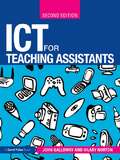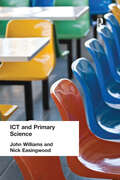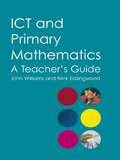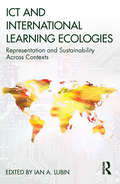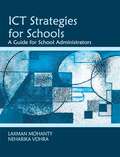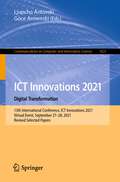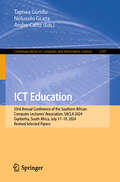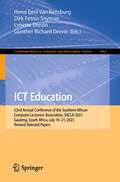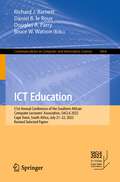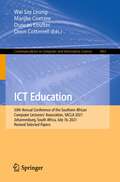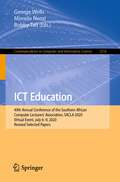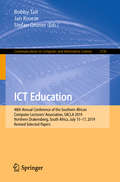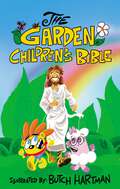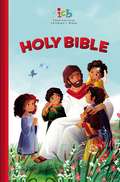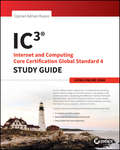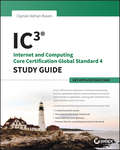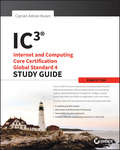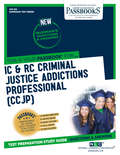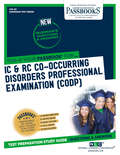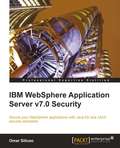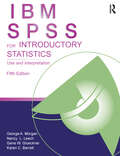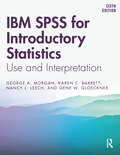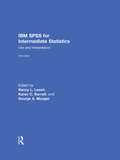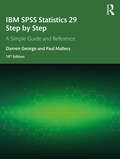- Table View
- List View
ICT for Teaching Assistants
by John Galloway Hilary NortonThe role of ICT in enhancing both teaching and learning in classrooms continues to develop, no more so than when in the hands of effective practitioners. This easy-to-use book outlines the many ways in which it can be used, both as a subject, and as a tool to support learning across the curriculum. Now fully updated to take into account innovations in ICT and the revised National Occupational Standards, ICT for Teaching Assistants looks at the impact of these changes and includes: Practical examples of how ICT, including web-based tools such as ‘blogs’ and ‘wikis’, can be used; Guidance to working competently and safely on the internet; Suggestions for activities with ideas for how these can be used in a variety of contexts; Advice on gathering evidence to help build assessment plans Information on health and safety and legal requirements. With links throughout to the National Occupational Standards for Teaching Assistants at Levels 2 and 3, this accessible book is essential for teaching assistants who wish to develop their confidence in ICT.
ICT and Primary Science
by John Williams Nick EasingwoodThroughout this book, the authors emphasize that primary science is at its best as a practical, hands-on experience for children. When ICT is used in an integral way, it can enable practical work to be done at a more sophisticated level, helping children to make sense of their findings. The book includes several case studies from primary classrooms and each chapter includes practical suggestions for teachers. The wide-ranging topics covered include: databases and spreadsheets data logging control technology ICT, drama and science school visits planning for ICT and science choosing and using software. ICT and Primary Science is an accessible and jargon-free resource for teachers and student teachers of primary science.
ICT and Primary Mathematics: A Teacher's Guide
by John Williams Nick EasingwoodThis book is for teachers who are looking for interesting and practical ways to incorporate ICT into their daily lesson plans. It shows how ICT can be used as a tool for mathematics, but more importantly how its proper use can enhance the mathematics being taught. The authors cover all current aspects of ICT and mathematics, including: databases spreadsheets logo and the use of floor turtles and control technology handling of resources including interactive whiteboards management of ICT within the classroom how ICT can be used to present mathematical topics and links to other areas of the curriculum. With plenty of suggestions on how to use the software and hardware described in the book, this is a useful resource for all primary teachers, particularly subject co-ordinators for ICT and mathematics. It will also be of interest to students on PGCE and Initial Teacher Training courses.
ICT and International Learning Ecologies: Representation and Sustainability Across Contexts
by Ian A. LubinICT and International Learning Ecologies addresses new ways to explore international, comparative, and cultural issues in education and technology. As today’s development orthodoxies push societies around the world to adopt imported information communication tools, new approaches are needed that integrate cultural responsiveness, autonomy, and sustainability into technology-enhanced learning. This edited collection conceptually and methodologically reframes the complexities of teaching and learning in historically marginalized communities around the world, where inequities are often exacerbated by one-size-fits-all programs. Graduate students and researchers of educational technology, international/comparative education, and sustainability education will be better prepared to lead information and communication technologies (ICT) implementation across a range of contexts and learner identities.
ICT Strategies for Schools: A Guide for School Administrators
by Laxman Mohanty Neharika VohraRecognizing the potential of ICTs to make the classroom transaction of curriculum significantly more relevant and purposeful, principals and school administrators in India need to design appropriate IT strategies and oversee the entire implementation process in their schools. This book is guide to the use of ICT in schools, covering issues of pedagogy, curriculum and learning. In brief, it deals with - Education uses of IT - Criteria for selection of hardware and software - Designing an IT-assisted curriculum - Teacher recruitment, training and desired competencies - Management and financial issues - Possible problem areas: plagiarism, privacy, hacking Lucidly written, with case studies highlighting successful strategies, this volume will be of immense importance to principals and administrators of schools as also students of education.
ICT Innovations 2021. Digital Transformation: 13th International Conference, ICT Innovations 2021, Virtual Event, September 27–28, 2021, Revised Selected Papers (Communications in Computer and Information Science #1521)
by Ljupcho Antovski Goce ArmenskiThis book constitutes the refereed proceedings of the 13th International ICT Innovations Conference, ICT Innovations 2021, held as virtual event in September 2021.The 15 full papers presented were carefully reviewed and selected from 58 submissions. The papers are organized in topical sections on deep learning and AI; NLP and social network analysis; theoretical foundations and information security; e-services; sensor systems, IoT.
ICT Education: 53rd Annual Conference of the Southern African Computer Lecturers' Association, SACLA 2024, Gqeberha, South Africa, July 17–19, 2024, Revised Selected Papers (Communications in Computer and Information Science #2397)
by Tapiwa Gundu Noluxolo Gcaza Andre CalitzThis book constitutes the refereed proceedings of the 53rd Annual Conference of the Southern African Computer Lecturers' Association on ICT Education, SACLA 2024, held in Gqeberha, South Africa, during July 17–19, 2024. The 10 full papers included in this book were carefully reviewed and selected from 53 submissions. The SACLA 2024 conference served as a distinguished platform for exchanging original research and practical experiences, fostering dialogue on the teaching and learning of Information Systems, Computer Science, Information Technology and related disciplines.
ICT Education: 52nd Annual Conference of the Southern African Computer Lecturers' Association, SACLA 2023, Gauteng, South Africa, July 19–21, 2023, Revised Selected Papers (Communications in Computer and Information Science #1862)
by Lynette Drevin Henri Emil Van Rensburg Dirk Petrus Snyman Günther Richard DrevinThis book constitutes the refereed proceedings of the 52nd Annual Conference of the Southern African Computer Lecturers' Association on ICT Education, SACLA 2023, held in Gauteng, South Africa, during July 19–21, 2023. The 12 full papers included in this book were carefully reviewed and selected from 42 submissions. They were organized in topical sections as follows: student centered teaching and learning; AI and future movements; programming; and beyond the classroom.
ICT Education: 51st Annual Conference of the Southern African Computer Lecturers' Association, SACLA 2022, Cape Town, South Africa, July 21–22, 2022, Revised Selected Papers (Communications in Computer and Information Science #1664)
by Bruce W. Watson Richard J. Barnett Daniel B. le Roux Douglas A. ParryThis book constitutes the refereed proceedings of the 51st Annual Conference of the Southern African Computer Lecturers' Association, SACLA 2022, held in Cape Town, South Africa, during July 21–22, 2022.The 10 full papers were included in this book were carefully reviewed and selected from 31 submissions. They were organized in topical sections as follows: curriculum; assessment; teaching in context; innovative teaching; and pandemic pedagogy.
ICT Education: 50th Annual Conference of the Southern African Computer Lecturers' Association, SACLA 2021, Johannesburg, South Africa, July 16, 2021, Revised Selected Papers (Communications in Computer and Information Science #1461)
by Marijke Coetzee Wai Sze Leung Duncan Coulter Deon CotterrellThis book constitutes the refereed proceedings of the 50th Annual Conference of the Southern African Computer Lecturers' Association on ICT Education, SACLA 2021, held in Johannesburg, South Africa in July 2021. The 9 revised full papers presented were carefully reviewed and selected fromthe 23 submissions. One invited paper was also included in this volume. The papers are organized in following topical sections: past, present and future; teaching innovation; teaching methods and strategies.
ICT Education: 49th Annual Conference of the Southern African Computer Lecturers' Association, SACLA 2020, Virtual Event, July 6–9, 2020, Revised Selected Papers (Communications in Computer and Information Science #1518)
by Bobby Tait George Wells Monelo NxoziThis book constitutes the refereed proceedings of the 49th Annual Conference of the Southern African Computer Lecturers' Association on ICT Education, SACLA 2019, held in a virtual mode in South Africa, in July 2020. The 13 revised full papers presented were carefully reviewed and selected from 55 submissions. The papers focus on practical experiences in computing education, novel tools for learning and/or assessment, and research investigating aspects of computing education.
ICT Education: 48th Annual Conference of the Southern African Computer Lecturers’ Association, SACLA 2019, Northern Drakensberg, South Africa, July 15–17, 2019, Revised Selected Papers (Communications in Computer and Information Science #1136)
by Stefan Gruner Bobby Tait Jan KroezeThis book constitutes the refereed proceedings of the 48th Annual Conference of the Southern African Computer Lecturers' Association on ICT Education, SACLA 2019, held in Northern Drakensberg, South Africa, in July 2019. The 16 revised full papers presented were carefully reviewed and selected from 57 submissions. The papers are organized in following topical sections: computer programming education; system security education; software engineering education; education of post-graduate research-students; our students, our profession.
ICB, The Garden Children's Bible: International Children's Bible
by Thomas NelsonThe Garden Children&’s Bible is a great way to get kids to &“toon&” into Scripture! Lenny the Lion and Lucy the Lamb are sent out on adventures by The Boss (God), who teaches them lessons from His Word along the way. Presented by characters based on the animated series The Garden, created by award-winning animator Butch Hartman, this illustrated Bible depicts over 100 stories from the storyline of Scripture.Kids will delight in the five, full-color comic strips based on The Garden animated series spaced throughout the Bible. Twenty more full-color pages of characters and stories from Scripture will draw kids into the stunning color and original designs by Hartman.In addition to the art, one hundred short, foundational pieces of wisdom from The Boss appear in the Bible to give children easy takeaways they will carry with them for a lifetime. Two hundred Lenny and Lucy character sidebars explain key biblical concepts in clear, easy-to-understand language that helps children better connect with the content in God&’s Word. And fifty prayers developed around Scripture teach children how to pray God&’s Word.Scripture memorization lists, promises from Scripture, a kid-friendly topical index, dictionary, a reading plan, activity pages, and more are in this fun and encouraging Bible.Features include:PRESENTATION PAGE – Personalize the Bible by recording a memory or noteBIBLE BOOK INTRODUCTIONS – Concise overviews highlight important events in each book300 CHARACTER CALLOUTS- Sidebar notes presented by Lenny, Lucy, and &“The Boss&” bring emphasis to key Biblical conceptsFULL-COLOR MULTI-PAGE COMIC SECTION BASED ON THE ANIMATED SERIESBIBLE LEARNING LISTS – Names of God, Bible Verses to Memorize, Miracles of Jesus, Scripture PromisesEND-OF-PAGE CROSS-REFERENCES – Find related passages quickly and easilyTOPICAL INDEX AND DICTIONARY – Kid-friendly tools teaching how to use the BibleMIRACLES and PARABLES of JESUS – Charts create a quick reference to important events50 SCRIPTURE-BASED PRAYERSThe International Children&’s Bible® (ICB) translation was created especially for children in the third grade and up and provides the ideal blend of readability and fidelity to the original meaning of the Scripture text.
ICB, Holy Bible: International Children's Bible
by Thomas NelsonThe ICB Holy Bible is filled with dozens of full-page, beautifully designed, color illustrations to help children visualize popular Bible characters and events.The International Children&’s Bible®, created especially for children in the third grade and up, provides the ideal blend of readability and fidelity to the original meaning of the Scripture texts. While the large print and bold subheadings make it easy to read, this edition is also filled with features that speak directly to children&’s hearts and minds. And boldfaced key words are linked to the Bible&’s robust dictionary to help increase a child&’s comprehension of Scripture.The beautiful illustrations set alongside Bible text are sure to delight your child&’s imagination as they &“see&” popular Bible stories come to life. This Bible includes study helps designed specifically for beginning Bible readers, such as Scripture memorization, &“Miracles of Jesus,&” and &“Kids in the Bible,&” that will help strengthen their knowledge of Scripture.Features include:A convenient &“Where Do I Find It?&” index to track down special biblical characters and eventsStudy helps designed specifically for beginner Bible readers, including Scripture memorization, &“Miracles of Jesus,&” &“Names of God,&” &“Kids in the Bible,&” and the importance of reading the BibleA listing of God&’s promises on such topics as love, peace, protection, and healthDetailed ICB Dictionary describing key Bible characters and termsReading Plans provide an easy framework to help guide kids as they experience God in his wordFull color Bible maps help to visualize historical events and where they happenedReadable 10-point print size displayed in a double column format
IC3: Internet and Computing Core Certification Living Online Study Guide
by Ciprian Adrian RusenUse the Internet safely and ethically in preparation for the IC3 exam IC3: Internet and Computing Core Certification Living Online Study Guide is your ideal study guide to focus on the Living Online exam module in preparation for the IC3 exam. This book covers working in a networked environment, using the Internet, electronic collaboration, and the safety issues surrounding online communication, presented in a clear, concise style. Hands-on examples and self-paced exercises show readers how to perform critical tasks needed to pass the exam, and the companion website offers study tools including the Sybex test engine, a pre-assessment test, practice questions, and videos. You will also have access to over one hundred electronic flashcards, and the chapter files needed to complete the exercises in the book. The Internet and Computing Core Certification exam measures a candidate on key and fundamental computing skills, ensuring their ability to get the most value and impact from computer technology. This guide focuses on the Living Online module of the IC3, testing your skills and solidifying your understanding in preparation for the exam. Review the basics of electronic communication and collaboration Master internet navigation and the networked environment Understand computing and the Internet's impact on society at large Brush up on the safety, ethical, and responsibility issues of Internet use When you are serious about certification, IC3 provides the practice that inspires self-confidence.
IC3: Internet and Computing Core Certification Key Applications Global Standard 4 Study Guide
by Ciprian Adrian RusenMaster word processing, spreadsheets, and presentations ahead of the IC3 exam IC3: Internet and Computing Core Certification Key Applications Study Guide is your ideal study guide when you want to focus on the Key Applications exam module in preparation for the IC3. This book covers common features and functions, word processing, spreadsheets, and presentations, all presented in a clear, concise style. Hands-on examples and self-paced exercises show you how to perform critical tasks needed to pass the exam, and the companion website offers a diverse set of study tools including the Sybex test engine, a preassessment test, hundreds of practice questions, videos, and access to over one hundred electronic flashcards. Test your skills and solidify your understanding of Key Applications for the IC3. Master the functions common to all programs, and the most common features Review the basics of word processing, with formatting and automation Understand spreadsheets, and how to manipulate data with formulas Brush up on the creation and formatting of simple presentations When you are serious about certification, IC3 provides the practice that inspires self-confidence.
IC3: Internet and Computing Core Certification Global Standard 4 Study Guide
by Ciprian Adrian RusenHands-on IC3 prep, with expert instruction and loads of tools IC3: Internet and Computing Core Certification Global Standard 4 Study Guide is the ideal all-in-one resource for those preparing to take the exam for the internationally-recognized IT computing fundamentals credential. Designed to help candidates pinpoint weak areas while there's still time to brush up, this book provides one hundred percent coverage of the exam objectives for all three modules of the IC3-GS4 exam. Readers will find clear, concise information, hands-on examples, and self-paced exercises that demonstrate how to perform critical tasks. This useful guide includes access to a robust set of learning tools, including chapter review questions, a practice test environment, electronic flashcards, and author videos that explain complex topics. The certification consists of three separate exams: Computing Fundamentals, Key Applications, and Living Online. Candidates are given fifty minutes to answer forty-five questions, so rapid recall and deep understanding are critical to success. IC3: Internet and Computing Core Certification Global Standard 4 Study Guide provides expert instruction on everything candidates need to know, including hardware, software, networking, and more. Review operating system basics and common application features Understand troubleshooting and safe computing Learn basic word processing, spreadsheet, presentation, and database activities Study networking concepts, digital communication, and research fluency The exam includes both multiple choice and performance-based questions, and this guide provides plenty of both so candidates can get comfortable with both material and format. More than just a memorization tool, this book helps exam candidates understand the material on a fundamental level, giving them a greater chance of success than just going it alone. For the IC3 candidate who's serious about certification, IC3: Internet and Computing Core Certification Global Standard 4 Study Guide is the complete, hands-on exam prep guide.
IC3: Internet and Computing Core Certification Computing Fundamentals Study Guide
by Ciprian Adrian RusenTest how well you know your way around a computer for the IC3 exam IC3: Internet and Computing Core Certification Computing Fundamentals Study Guide is your ideal study guide to focus on the Computing Fundamentals exam module in preparation for the IC3 exam. This book covers hardware, software, peripherals, operating systems, and basic troubleshooting, presented in a clear, concise style. Hands-on examples and self-paced exercises show you how to perform critical tasks needed to pass the exam, and the companion website offers a diverse set of study tools including the Sybex test engine, a preassessment test, practice questions, and videos. Readers also gain access to electronic flashcards, and the chapter files needed to complete the exercises in the book. This guide focuses on the Computing Fundamentals module helping you test your skills and solidify your understanding in preparation for the exam. Review the various hardware components essential to the computer Understand which peripherals are crucial, and which are nice to have Brush up on basic troubleshooting for common minor issues Master your operating system and fundamental software When you are serious about certification, IC3 provides the practice that inspires self-confidence.
IC & RC Criminal Justice Addictions Professional: Passbooks Study Guide (Admission Test Series)
by National Learning CorporationThe Admission Test Series prepares students for entrance examinations into college, graduate and professional school as well as candidates for professional certification and licensure. The IC & RC Criminal Justice Addictions Professional (CCJP) Passbook® prepares you by sharpening the skills and abilities necessary to succeed on your upcoming certification exam. It provides hundreds of questions and answers in the areas that will likely be covered on your upcoming exam, including but not limited to:addiction and criminal behavior; criminal justice system; case management; treatment and recovery planning; counseling; and more.
IC & RC Co-Occurring Disorders Professional Examination: Passbooks Study Guide (Admission Test Series)
by National Learning CorporationThe Admission Test Series prepares students for entrance examinations into college, graduate and professional school as well as candidates for professional certification and licensure. The IC & RC Co-Occurring Disorders Professional Examination Passbook® prepares you by sharpening the skills and abilities necessary to succeed on your upcoming entrance exam. It provides hundreds of questions and answers in the areas that will likely be covered on your upcoming exam, including but not limited to:screening and assessment; crisis prevention and management; treatment and recovery planning; counseling; and more.
IBM WebSphere Application Server v7.0 Security
by Omar SiliceoWith this book you will explore WebSphere Application Server security concepts, which you can expand upon while working on mini-projects. With the author's style of writing you will gain the knowledge and confidence needed to implement WebSphere Application Servers securely. Right from the basics of securing your WebSphere Application Server to advanced security features, the author utilizes exercises, screenshots, and clear instructions. If you are a system administrator or an IT professional who wants to learn about the security side of the IBM WebSphere Application Server v7.0, this book will walk you through the key aspects of security and show you how to implement them. You do not need any previous experience in WebSphere Application Server, but some understanding of Java EE technologies will be helpful. In addition, Java EE application developers and architects who want to understand how the security of a WebSphere environment affects Java EE enterprise applications will find this book useful.
IBM SPSS for Introductory Statistics: Use and Interpretation, Fifth Edition
by George A. Morgan Nancy L. Leech Karen C. Barrett Gene W. GloecknerDesigned to help students analyze and interpret research data using IBM SPSS, this user-friendly book, written in easy-to-understand language, shows readers how to choose the appropriate statistic based on the design, and to interpret outputs appropriately. The authors prepare readers for all of the steps in the research process: design, entering and checking data, testing assumptions, assessing reliability and validity, computing descriptive and inferential parametric and nonparametric statistics, and writing about outputs. Dialog windows and SPSS syntax, along with the output, are provided. Three realistic data sets, available on the Internet, are used to solve the chapter problems. The new edition features: Updated to IBM SPSS version 20 but the book can also be used with older and newer versions of SPSS. A new chapter (7) including an introduction to Cronbach’s alpha and factor analysis. Updated Web Resources with PowerPoint slides, additional activities/suggestions, and the answers to even-numbered interpretation questions for the instructors, and chapter study guides and outlines and extra SPSS problems for the students. The web resource is located www.routledge.com/9781848729827 . Students, instructors, and individual purchasers can access the data files to accompany the book at www.routledge.com/9781848729827 . IBM SPSS for Introductory Statistics, Fifth Edition provides helpful teaching tools: All of the key IBM SPSS windows needed to perform the analyses. Complete outputs with call-out boxes to highlight key points. Flowcharts and tables to help select appropriate statistics and interpret effect sizes. Interpretation sections and questions help students better understand and interpret the output. Assignments organized the way students proceed when they conduct a research project. Examples of how to write about outputs and make tables in APA format. Helpful appendices on how to get started with SPSS and write research questions. An ideal supplement for courses in either statistics, research methods, or any course in which SPSS is used, such as in departments of psychology, education, and other social and health sciences. This book is also appreciated by researchers interested in using SPSS for their data analysis.
IBM SPSS for Introductory Statistics: Use and Interpretation
by George A. Morgan Nancy L. Leech Karen C. Barrett Gene W. GloecknerIBM SPSS for Introductory Statistics is designed to help students learn how to analyze and interpret research. In easy-to-understand language, the authors show readers how to choose the appropriate statistic based on the design, and to interpret outputs appropriately. There is such a wide variety of options and statistics in SPSS, that knowing which ones to use and how to interpret the outputs can be difficult. This book assists students with these challenges. Comprehensive and user-friendly, the book prepares readers for each step in the research process: design, entering and checking data, testing assumptions, assessing reliability and validity, computing descriptive and inferential parametric and nonparametric statistics, and writing about results. Dialog windows and SPSS syntax, along with the output, are provided. Several realistic data sets, available online, are used to solve the chapter problems. This new edition includes updated screenshots and instructions for IBM SPSS 25, as well as updated pedagogy, such as callout boxes for each chapter indicating crucial elements of APA style and referencing outputs. IBM SPSS for Introductory Statistics is an invaluable supplemental (or lab text) book for students. In addition, this book and its companion, IBM SPSS for Intermediate Statistics, are useful as guides/reminders to faculty and professionals regarding the specific steps to take to use SPSS and/or how to use and interpret parts of SPSS with which they are unfamiliar.
IBM SPSS for Intermediate Statistics: Use and Interpretation, Fifth Edition
by George A. Morgan Nancy L. Leech Karen C. BarrettDesigned to help readers analyze and interpret research data using IBM SPSS, this user-friendly book shows readers how to choose the appropriate statistic based on the design; perform intermediate statistics, including multivariate statistics; interpret output; and write about the results. The book reviews research designs and how to assess the accuracy and reliability of data; how to determine whether data meet the assumptions of statistical tests; how to calculate and interpret effect sizes for intermediate statistics, including odds ratios for logistic analysis; how to compute and interpret post-hoc power; and an overview of basic statistics for those who need a review. Unique chapters on multilevel linear modeling; multivariate analysis of variance (MANOVA); assessing reliability of data; multiple imputation; mediation, moderation, and canonical correlation; and factor analysis are provided. SPSS syntax with output is included for those who prefer this format. The new edition features: * IBM SPSS version 22; although the book can be used with most older and newer versions * New discusiion of intraclass correlations (Ch. 3) * Expanded discussion of effect sizes that includes confidence intervals of effect sizes (ch.5) * New information on part and partial correlations and how they are interpreted and a new discussion on backward elimination, another useful multiple regression method (Ch. 6) * New chapter on how to use a variable as a mediator or a moderator (ch. 7) * Revised chapter on multilevel and hierarchical linear modeling (ch. 12) * A new chapter (ch. 13) on multiple imputation that demonstrates how to deal with missing data * Updated web resources for instructors including PowerPoint slides and answers to interpretation questions and extra problems and for students, data sets, chapter outlines, and study guides. IBM SPSS for Intermediate Statistics, Fifth Edition provides helpful teaching tools: * all of the key SPSS windows needed to perform the analyses * outputs with call-out boxes to highlight key points * interpretation sections and questions to help students better understand and interpret the output * extra problems with realistic data sets for practice using intermediate statistics * Appendices on how to get started with SPSS, write research questions, and basic statistics. An ideal supplement for courses in either intermediate/advanced statistics or research methods taught in departments of psychology, education, and other social, behavioral, and health sciences. This book is also appreciated by researchers in these areas looking for a handy reference for SPSS
IBM SPSS Statistics 29 Step by Step: A Simple Guide and Reference
by Darren George Paul MalleryIBM SPSS Statistics 29 Step by Step: A Simple Guide and Reference, eighteenth edition, takes a straightforward, step-by-step approach that makes SPSS software clear to beginners and experienced researchers alike.Extensive use of four-color screen shots, clear writing, and step-by-step boxes guide readers through the program. Output for each procedure is explained and illustrated, and every output term is defined. Exercises at the end of each chapter support students by providing additional opportunities to practice using SPSS. This book covers the basics of statistical analysis and addresses more advanced topics such as multidimensional scaling, factor analysis, discriminant analysis, measures of internal consistency, MANOVA (between- and within-subjects), cluster analysis, Log-linear models, logistic regression, and a chapter describing residuals. New to this edition is a new chapter on meta-analysis that describes new SPSS procedures for analyzing effect sizes across studies, and the content has been thoroughly updated in line with the latest version of the SPSS software, SPSS 29. The end sections include a description of data files used in exercises, an exhaustive glossary, suggestions for further reading, and a comprehensive index.Accompanied by updated online instructor’s materials and website data files, this is an essential resource for instructors and students needing a guide to using SPSS in their work, across the social sciences, behavioural sciences, education, and beyond.
